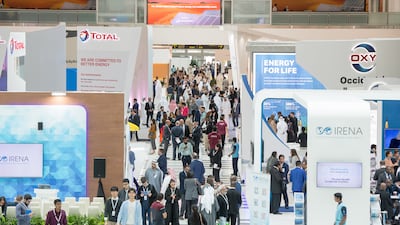Global energy executives and ministers will gather in Abu Dhabi on Tuesday to discuss ways to speed up the global transition to clean energy.
The World Future Energy Summit, which will run from April 16 to 18, is the UAE’s first major energy event since the Cop28 climate conference in Dubai, where countries made pledges to increase renewable energy capacity while reducing reliance on fossil fuels.
The event, which will be held at the Abu Dhabi National Exhibition Centre, is expected to draw more than 400 exhibitors and will feature high-profile speakers including ministers from Japan, the Netherlands and Cop29 host Azerbaijan.
Former British prime minister Boris Johnson will be one of the keynote speakers at the Green Hydrogen Summit, which will be held as a part of the World Future Energy Summit.
The Green Hydrogen Summit will feature a high-level ministerial panel focusing on national strategies and policies to accelerate green hydrogen economies.
Ministers participating in the panel will include Parviz Shahbazov, Azerbaijan’s Energy Minister, Yoshida Nobuhiro, Japan's vice minister of economy, trade and industry, and Frederik Wisselink, energy special envoy of the Netherlands' Ministry of Economic Affairs and Climate Policy.
“Cop28 has laid down the mandates; the task now is how public and private sectors react and partner up to implement solutions which will achieve the objectives,” Leen Al Sebai, show director of the World Future Energy Summit, said this month.
“The task is cross-sector and multi-channel, which is why the Climate and Environment Conference takes a comprehensive approach to sector examination."
Experts will explore ways to expedite progress across various sectors, including tourism, manufacturing, aviation, investment, agriculture, utilities, energy, construction, transport and health care, through keynote speeches, panel talks, informal discussions and in-depth case studies.
This year’s summit will feature a dedicated Climate and Environment Conference, which will explore the outcomes of Cop28.
It will also feature a dedicated case study on the role of solar energy in improving health care in off-grid communities across Africa, as well as a panel discussion on bridging skills gaps for long-term careers in climate.
For the first time at the summit, a one-day conference called Pathway to 1.5C will take place, where officials will discuss the crucial role of policy, equitable energy transition, innovation and climate action for achieving net-zero targets.
Chief executives from a range of industries will also share insights on strategies to lower emissions.
At Cop28, countries pledged to triple renewable energy capacity and double energy efficiency by 2030.
Fifty oil and gas companies, representing more than 40 per cent of global oil production, signed the Oil and Gas Decarbonisation Charter, which calls for net-zero emissions by 2050 or before.
Global renewable energy use set a record in 2023 as transition efforts continued but it fell short of levels required to triple capacity by the end of the decade, the International Renewable Energy Agency said.
Renewable energy capacity in the power sector grew by 473 gigawatts from 2022 to 3,870 gigawatts last year, the Abu Dhabi-based agency said in a report last month.
Although renewables accounted for 86 per cent of total capacity additions in the energy sector globally, compared with 84 per cent in 2022, the growth was unevenly distributed around the world, the agency said.

